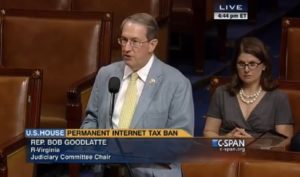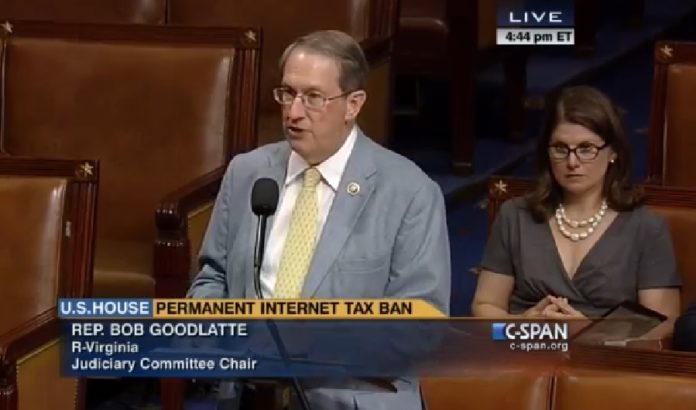 The U.S. House voted Wednesday to permanently ban states from taxing internet access. The “Permanent Internet Tax Freedom Act” passed the House unanimously. However, it may fail in the Senate where a measure could be added to the bill which would enable states to tax online retailers without a brick-and mortar presence. The “Marketplace Fairness Act” has support from powerful groups like the U.S. Chamber of Commerce and the National Governors Association who believe that such a measure is needed in order to level the playing field between traditional storefront businesses and online retailers. Conservative opponents in the Senate believe such a law would cripple small online businesses who would be forced to collect and remit sales taxes to over 9,000 municipal jurisdictions across the country.
The U.S. House voted Wednesday to permanently ban states from taxing internet access. The “Permanent Internet Tax Freedom Act” passed the House unanimously. However, it may fail in the Senate where a measure could be added to the bill which would enable states to tax online retailers without a brick-and mortar presence. The “Marketplace Fairness Act” has support from powerful groups like the U.S. Chamber of Commerce and the National Governors Association who believe that such a measure is needed in order to level the playing field between traditional storefront businesses and online retailers. Conservative opponents in the Senate believe such a law would cripple small online businesses who would be forced to collect and remit sales taxes to over 9,000 municipal jurisdictions across the country.
In Minnesota, the federal measure to tax all online sales has support from the Minnesota Business Partnership, the Minnesota Chamber of Commerce, and the Minnesota Retailers Association.
While the federal debate to tax internet commerce goes on, states like Minnesota have already moved ahead to generate tax revenues from digitally transmitted internet goods. Two years ago, the Democrat-controlled Minnesota legislature imposed a new sales tax on specified digitally downloaded products including music, books, movies, television programming, and video games. While a bill was introduced this session by Rep Joe McDonald, R-Delano to repeal the tax, it never made it to the floor of the Minnesota House.
According to the MN Department of Revenue, the tax which was enacted in 2013, is expected to generate $10 million in the upcoming fiscal year of 2016 and $13.2 million by 2019. The revenue is mostly directed to the state’s general budget fund, however 5% goes to a “Natural resources and arts fund.”
New streams of revenue will be required to feed the always-increasing Minnesota state budget. Efforts at the federal level to free states to tax businesses with no physical presence within their borders should be carefully watched by consumers. Minnesota, with it’s coalition of liberal-special interests and powerful business lobby, would likely be an early adapter of yet another new tax.











